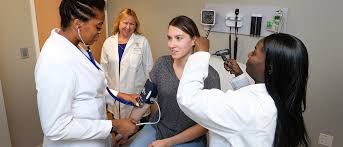National Nurse Practitioner Week kicks off on November 7 and ushers in celebrations honoring the work of nurse practitioners (NPs) everywhere while also raising awareness of the career path and of the need for more NPs in healthcare.
Sponsored by the American Association of Nurse Practitioners (AANP) and honored by many healthcare organizations, National Nurse Practitioner Week recognizes the many skills NPs bring to their patient care approach.
According to the AANP, nurse practitioners diagnose and treat health conditions, but also bring in the perspective of disease prevention and health management to patient care. As nurse practitioners look at the whole patient, they are able to identify areas that also might be impacted by a diagnosis or health condition and help patients manage and mitigate any symptoms.
For example, a patient with an inflammatory bowel disease diagnosis might benefit from additional information about the importance of sleep and nutrition. A patient with a family history of certain cancers will benefit from additional guidance around healthy behaviors and additional screening for prevention.
Nurse practitioners must have additional education and training above and beyond their RN status. Nurse practitioners have either a master’s or doctorate degree and have completed additional training in healthcare settings. With this elevated expertise, nurse practitioners are practically and legally able to care for their patients in ways RNs cannot. A nurse practitioner can diagnose and treat patients, prescribe medications, and order and interpret lab and diagnostic testing. They often are involved in research and advocacy as well.
As they move through their careers, nurse practitioners are sought after for their expertise and their experience treating many patients and conditions and practicing under the overall scope of reinforcing prevention and healthy lifestyle behaviors. As all nurses, NPs are especially focused on patient education and helping patients achieve their healthiest lives within the parameters of their health conditions.
The personal connections NPs make with their patients are exceptionally valuable to both. Nurses work closely with patients to understand their daily habits and any socioeconomic influences that could act as barriers in their pursuit of good health. Nurse practitioners are excellent at making connections to specialists when patients need that care and working with other healthcare providers to help ensure the best outcomes.
NPs practice under the regulations of their state’s license and regulation guidelines. In nearly half of the states, NPs are given the authority to practice autonomously and can establish their own practice without being required to have physician oversight. Typically, nurses in these roles are family care providers and their practices are especially needed in rural and urban areas where healthcare is difficult to access or in especially high demand. NPs in autonomous practice can help ease the shortage of primary care physicians and often have great career growth and satisfaction.
A career as a nurse practitioner offers nurses a chance to become experts in the field and to expand their scope of practice and with that, their impact on patients is multiplied.
- Is the FNP Program Right for You? - April 24, 2024
- WOC Nurses Week Highlights Specialty - April 16, 2024
- Honoring Radiology Nurses Day on April 12 - April 12, 2024



